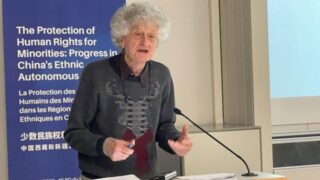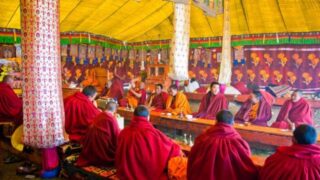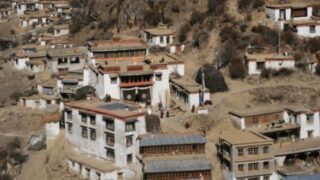Candidates will be examined for their “ideological and political morality.” “Separatists” and those involved in “illegal” religion will be excluded.
by Lopsang Gurung


CCP propaganda continuously tells the world that, thanks to China, Tibet now has a regular university systems, which did not exist under the “backward” Dalai Lama administration. Of course, the university system evolved in the last decades, but the same happened in many Asian countries that were not invaded by their neighbors and are not oppressed by the totalitarian rule of a Communist Party.
Tibet’s university, also, is not for everybody. Tibetans have known this for many years, as those suspected of supporting the Dalai Lama were either not admitted or expelled from universities. Now, this is spelled out in official regulations.
On April 22, 2022, China’s Ministry of Education published “The Tibet Autonomous Region’s 2022 Regular College Admissions Regulations.” A good part of these regulations includes the usual criteria for admitting to colleges the best high school students, and quotas for certain ethnic minorities. These rules exist in many countries of the world, and are not particularly objectionable.
However, from Section 12 on we are confronted with something different. Under the heading “Ideological and Political Morality Assessment,” it is explained that being an outstanding student is not enough to be admitted to a university in Tibet. Actually, “ideological and political morality” is the “main” standard for admission.
The academic authorities “shall make a comprehensive appraisal of the examinee’s political attitude and ideological morality, and be responsible for its authenticity.” Since in an interview the candidates can try to fool them, they should consult the Communist Party officers of the city or village where each candidate lives.
Universities should make sure that candidates have never supported “in words or in deeds” movements or activities that “endangers the unity of the motherland or national unity.” Tibetans understand that these activities and movements are all forms of support for the Dalai Lama and what the CCP refers to as “the separatist Dalai clique.” It is also needed, the Regulations say, that the candidate has not been involved in “xie jiao” (i.e., “illegal” religious movements). Conversely, if the candidates are proficient in “Marxist theory,” they are eligible for a preferential lane for admission.
The CCP claims that it brought state-of-the-art colleges to Tibet. But it did not bring all bright young Tibetans to college.









